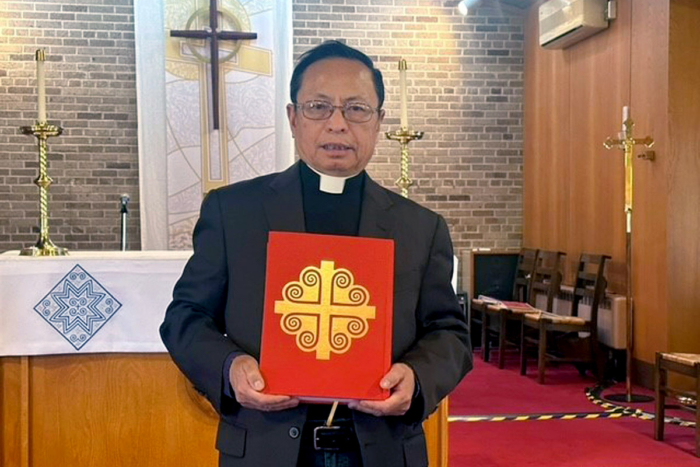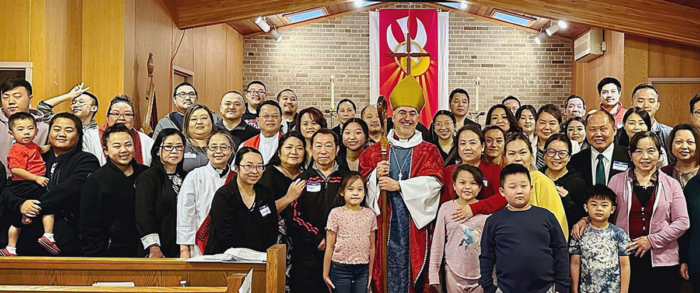Minnesota priest compiles dual-language Gospel book for the only majority-Hmong Episcopal churchPosted May 22, 2023 |
|

The Rev. Wa Meng Lor holds the English-Hmong book of Sunday Gospel readings he created for use at the Church of the Holy Apostles in St. Paul. Minnesota, the only majority-Hmong congregation in The Episcopal Church. Photo: Courtesy of Wa Meng Lor
[Episcopal News Service] Compiling a book of the Sunday Gospel readings in both English and Hmong is just the latest way the Rev. Wa Meng Lor has helped members of the Church of the Holy Apostles in St. Paul, Minnesota, join their Hmong roots to their life in America.
Since 2019 Lor has been the vicar of the only majority-Hmong congregation in The Episcopal Church. Its members have roots in Laos, a Southeast Asian country that shares a border with Vietnam. And, he believes, his is the only majority-Hmong church in the Anglican Communion.
Lor started the parallel-text project during the early days of the COVID-19 pandemic when in-person services were suspended and he found himself with extra time on his hands. He used electronic versions of the Episcopal lectionary and a Hmong Bible, and following the three-year cycle of lectionary readings, he formatted more than 150 side-by-side sets of Gospel passages. Clergy colleagues from Holy Apostles looked them over before he sent it all to Mark Heiman, a non-Hmong, local Episcopalian with Loomis House Press, to lay out the book for print.
To Lor’s surprise, Heiman was able to find a few places that needed clarification. “He’s really incredible, that he can tell me that something does not make sense,” he said. “If you didn’t know him, you’d think he could read Hmong.” Lor and Heiman secured copyright permissions to reprint texts in both languages, and Heiman helped design the layout, donating his time for the project. The church covered the cost of printing 10 copies of the large book, bound in dark red with a traditional Hmong symbol printed in gold on the cover.
Having the two versions side-by-side in one volume will be a particular help on Sunday mornings since the worship service at Holy Apostles is bilingual. “Before we had to carry two books, and now it’s only one,” Lor said. Offering the service in both languages not only helps the handful of English-speaking members but also younger Hmong members, who may not speak Hmong, as well as older members who only speak Hmong, he said.
Lor and other Holy Apostles clergy presented a copy of the Gospel book to Minnesota Bishop Craig Loya in February, shortly after it was printed. The remaining copies will be used within the congregation or with other Hmong Episcopalians in the Twin Cities, where the largest number of Hmong people in the United States live, according to Pew Research Center.
This wasn’t the first time Lor has helped make parts of the Episcopal liturgy available in Hmong. In 2010 he and the church’s former vicar, the Rev. Bill Bulson, translated the Holy Eucharist, baptism and funeral rites, and all the Sunday collects. They originally had planned to translate the entire Book of Common Prayer, but Lor said that proved too big a task, so they concentrated on the services the congregation needed most.
Hmong people bring new life to Holy Apostles
Lor’s story, from growing up in Laos to becoming a member and then the leader of Holy Apostles, mirrors that of many church members who are part of a Hmong community that came to the United States as political refugees. After the Laotian government fell to communist forces in 1975, Hmong people were targeted and hundreds of thousands were murdered because many had fought alongside United States troops in spillover conflicts resulting from the Vietnam War. The church now includes subsequent generations of those families, along with a smaller number of American-born church members, as well as Latinos and people from Zimbabwe.
Lor, who is 63, grew up practicing the traditional Hmong religion of ancestor worship mediated by a shaman. When he was 14 and learned that a beloved cousin had become a Christian, he tried to talk him out of it. “We hated Christians because we thought they destroyed our culture,” he said. “I asked him why he did this, and why he betrayed his family.” But as the cousin explained the Christian faith to him, “It hit my heart that he did the right thing, that ancestor worship isn’t the right thing.” The cousin then taught him the Lord’s Prayer, and from that moment he considered himself a Christian. He secretly attended church with his cousin for months before telling his parents. He assured them there was no shame in being Christian, and a year later, they joined him. But by then, the Roman Catholic missionaries who had worked in Laos had fled the country, leaving no one available to baptize them.
In 1978 Lor decided he, too, needed to leave Laos, and he made his way to a refugee camp in Thailand, where he finally was baptized. Thanks to a U.S.-based sponsor, a year later he arrived in Denver, Colorado, and in 1982 he moved to St. Paul, which had become a hub for many of the wave of Hmong refugees being resettled in the U.S.
He and many others were faithful Roman Catholics, but they took issue with the church’s requirement of an all-male, celibate priesthood. “We are very family-oriented,” Lor said, which was a problem for people who felt called to be ordained, both men and women. They wanted to find a church that offered the sacraments they loved, and that allowed priests to marry, and where they could maintain Hmong culture, including their language and celebrations like Hmong New Year.
The search led them to The Episcopal Church, a denomination they hadn’t heard of before, and to Holy Apostles, where membership was dwindling, and then-Bishop James Jelinek had plans to close the church. After meeting with the church’s vicar, the Hmong community felt they had found a new church home, and in late 2004, 75 Hmong families, totaling several hundred people, became members. More than 200 Hmong people were confirmed the following year, and one of them, Toua Vang, went on to seminary. In 2013 he became the first Hmong priest in the Anglican Communion.

Minnesota Bishop Craig Loya with the 35 people he confirmed at the Church of the Holy Apostles on April 19. Another five members were confirmed at a diocesan service on April 29. Photo: Craig Loya via Facebook
A vital and growing congregation
Today about 125 families are members of Holy Apostles – about a dozen of which are non-Hmong – and an intensive formation program developed a decade ago has created a robust ministry team to serve them, made up of lay leaders, two deacons and three priests. Lor is one of those priests, along with the Rev. Bao Moua, the first Hmong woman to be ordained in The Episcopal Church.
Lor said that having a team of clergy helps meet the needs of the congregation, especially the Hmong members, who have different expectations of clergy than the English-speaking members do. The latter only need him when they are sick or in the hospital, he said, while Hmong members expect the priest’s participation at those times, as well as for weddings, graduations and family parties – events that won’t start until the priest arrives. “They have me booked up until September,” he said.
Loya, the diocese’s bishop, told ENS that Holy Apostles is growing and is “an incredibly vital congregation.” In April he confirmed more than 40 church members, and Lor said that scheduling conflicts kept even more from being present. The bishop said there isn’t an Episcopal church anywhere that doesn’t have challenges these days, including Holy Apostles, “but there is no question they are a leader and an inspiration in terms of following Jesus as a whole way of life, and what it looks like to be a vital congregation.” Members are active in diocesan life, Loya said, and the congregation is leading the way on diocesan priorities of congregational vitality and centering discipleship, “but they’re also leading the way in who we are trying to become as a diocese, and how we’re endeavoring to follow the way of Jesus together.”
Hmong is one of five languages spoken in Minnesota Episcopal congregations, he said, and that diversity is a true gift. “For us as followers of Jesus to confess God as Trinity means that we affirm the heart of the universe is friends without division and unity without uniformity.” Loya added, “Any time we encounter any form of diversity, we are always closer to the heart of God.”
–Melodie Woerman is a freelance writer and former director of communications for the Diocese of Kansas.

Social Menu